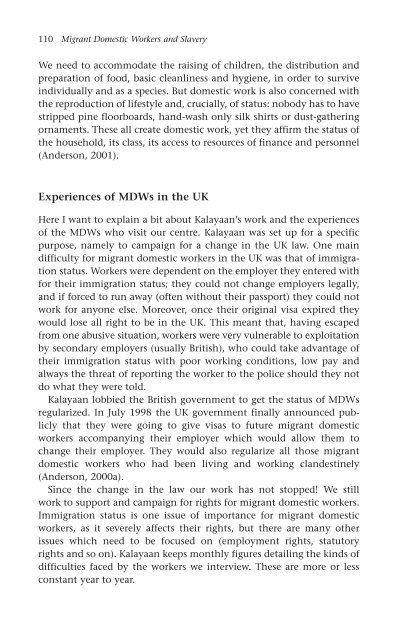3071-The political economy of new slavery
3071-The political economy of new slavery
3071-The political economy of new slavery
You also want an ePaper? Increase the reach of your titles
YUMPU automatically turns print PDFs into web optimized ePapers that Google loves.
110 Migrant Domestic Workers and Slavery<br />
We need to accommodate the raising <strong>of</strong> children, the distribution and<br />
preparation <strong>of</strong> food, basic cleanliness and hygiene, in order to survive<br />
individually and as a species. But domestic work is also concerned with<br />
the reproduction <strong>of</strong> lifestyle and, crucially, <strong>of</strong> status: nobody has to have<br />
stripped pine floorboards, hand-wash only silk shirts or dust-gathering<br />
ornaments. <strong>The</strong>se all create domestic work, yet they affirm the status <strong>of</strong><br />
the household, its class, its access to resources <strong>of</strong> finance and personnel<br />
(Anderson, 2001).<br />
Experiences <strong>of</strong> MDWs in the UK<br />
Here I want to explain a bit about Kalayaan’s work and the experiences<br />
<strong>of</strong> the MDWs who visit our centre. Kalayaan was set up for a specific<br />
purpose, namely to campaign for a change in the UK law. One main<br />
difficulty for migrant domestic workers in the UK was that <strong>of</strong> immigration<br />
status. Workers were dependent on the employer they entered with<br />
for their immigration status; they could not change employers legally,<br />
and if forced to run away (<strong>of</strong>ten without their passport) they could not<br />
work for anyone else. Moreover, once their original visa expired they<br />
would lose all right to be in the UK. This meant that, having escaped<br />
from one abusive situation, workers were very vulnerable to exploitation<br />
by secondary employers (usually British), who could take advantage <strong>of</strong><br />
their immigration status with poor working conditions, low pay and<br />
always the threat <strong>of</strong> reporting the worker to the police should they not<br />
do what they were told.<br />
Kalayaan lobbied the British government to get the status <strong>of</strong> MDWs<br />
regularized. In July 1998 the UK government finally announced publicly<br />
that they were going to give visas to future migrant domestic<br />
workers accompanying their employer which would allow them to<br />
change their employer. <strong>The</strong>y would also regularize all those migrant<br />
domestic workers who had been living and working clandestinely<br />
(Anderson, 2000a).<br />
Since the change in the law our work has not stopped! We still<br />
work to support and campaign for rights for migrant domestic workers.<br />
Immigration status is one issue <strong>of</strong> importance for migrant domestic<br />
workers, as it severely affects their rights, but there are many other<br />
issues which need to be focused on (employment rights, statutory<br />
rights and so on). Kalayaan keeps monthly figures detailing the kinds <strong>of</strong><br />
difficulties faced by the workers we interview. <strong>The</strong>se are more or less<br />
constant year to year.


